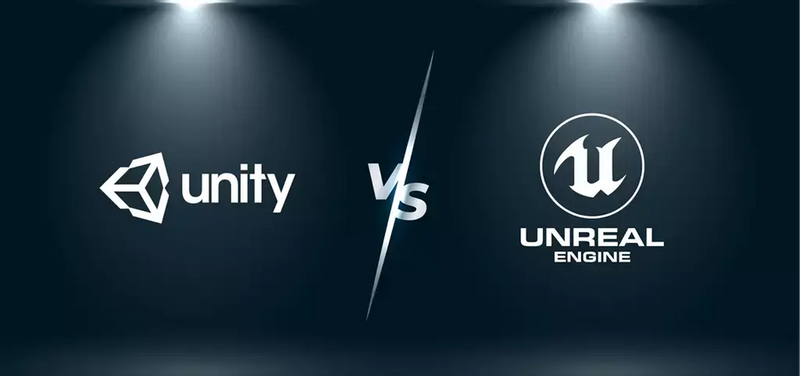Unity vs Unreal Engine: The 2025 Comparison Every Developer Needs

When it comes to choosing a game engine, the debate of Unity vs Unreal Engine remains one of the most important decisions for developers in 2025. Both engines dominate the gaming industry, powering everything from indie projects to AAA blockbusters, VR experiences, and mobile titles.
In this detailed Unity vs Unreal Engine comparison 2025, we’ll cover the key differences, pros and cons, beginner-friendliness, VR capabilities, coding requirements, and which engine might be best for your next project.
Unity vs Unreal Engine: Overview
Before diving into the details, here’s a quick snapshot of both engines:
-
Unity: Known for its flexibility, massive community, and dominance in mobile and indie development.
-
Unreal Engine (Unreal Engine 5 in 2025): Recognized for high-end visuals, advanced physics, and powering AAA games.
Both engines are free to start with, but their pricing and licensing models differ once your game begins to generate revenue.
Unity vs Unreal Engine 2025: Key Differences
If you’re looking at Unity vs Unreal Engine differences, here’s what stands out in 2025:
-
Graphics Quality: Unreal Engine 5 leads with Nanite (virtualized geometry) and Lumen (real-time lighting), making it ideal for photorealism. Unity has improved significantly with HDRP (High Definition Render Pipeline), but Unreal still dominates cinematic visuals.
-
Platform Reach: Unity continues to be the best engine for mobile, 2D games, and VR apps, while Unreal excels in PC, console, and AAA productions.
-
Ease of Use: Unity’s editor is lightweight and easier for beginners, while Unreal’s editor is more advanced but comes with a steeper learning curve.
-
Coding: Unity uses C#, beginner-friendly and widely used in software development. Unreal primarily uses C++, but developers can use Blueprints (visual scripting) to create gameplay without coding.
Unity vs Unreal Engine Editor Interface Comparison
When comparing Unity vs Unreal Engine editor interfaces, here’s what developers notice:
-
Unity Editor: Clean, minimal, and easier for beginners to grasp. Offers flexibility with asset integration and lightweight project management.
-
Unreal Engine Editor: More feature-packed, with advanced tools like Sequencer for cinematics, Nanite visualization, and a robust material editor. However, the sheer volume of options can overwhelm new users.
Unity vs Unreal Engine for Beginners (2025)
If you’re starting your game development journey, the choice between Unity vs Unreal Engine for beginners often depends on your goals:
-
Unity for Beginners:
-
Easier to learn due to C# scripting.
-
Huge library of tutorials, community support, and asset store resources.
-
Lightweight editor suitable for low-end hardware.
-
Best for indie, 2D, and mobile developers.
-
Unreal Engine 5 for Beginners:
-
Visual scripting via Blueprints helps reduce the coding barrier.
-
The editor has a steeper learning curve but offers industry-level tools.
-
Ideal if you plan to move into AAA development or cinematic projects.
-
Requires more powerful hardware to run smoothly.
Unity vs Unreal Engine for VR
Virtual Reality (VR) continues to be a growth area in 2025, and both Unity and Unreal offer strong VR development capabilities:
-
Unity for VR:
-
Flexible XR tools and plugins.
-
Easier setup for VR prototypes.
-
Widely used in VR training apps, healthcare simulations, and indie VR games.
-
Unreal Engine for VR:
-
Delivers unmatched visual fidelity for VR experiences.
-
Advanced physics and lighting create highly immersive worlds.
-
Preferred by studios working on AAA VR titles.
If you’re comparing Unity vs Unreal Engine for VR, Unity is faster for iterating prototypes, while Unreal is better for premium VR experiences.

Coding in Unity vs Unreal Engine
One of the most common questions is about coding in Unity vs Unreal Engine.
-
Unity (C#):
-
Uses C#, a beginner-friendly programming language also common in general software development.
-
Huge number of tutorials and resources online.
-
Easier for small teams and indie developers.
-
Unreal Engine (C++ + Blueprints):
-
Uses C++, a more complex but powerful programming language.
-
Unreal’s Blueprints Visual Scripting allows developers to build game logic without writing code, lowering the barrier for non-programmers.
-
Best for performance-intensive games and developers who want fine control over systems.
If you’re new to coding, Unity offers a gentler learning curve, while Unreal’s Blueprints offer a way to start coding visually before moving into C++.
Unity vs Unreal Engine Pros and Cons
Here’s a breakdown of the pros and cons of Unity vs Unreal Engine in 2025:
Unity Pros
-
Easier to learn for beginners.
-
Best for 2D games and mobile development.
-
Lightweight editor, works on lower hardware specs.
-
Huge Asset Store and active developer community.
-
Great for VR apps and AR projects.
Unity Cons
-
Graphics still trail behind Unreal for photorealism.
-
Large projects can run into performance bottlenecks.
-
Fewer built-in AAA-level cinematic tools.
Unreal Engine 5 Pros
-
Industry-leading graphics (Nanite + Lumen).
-
Blueprints reduce coding barrier.
-
Perfect for AAA, VR, and cinematic games.
-
Powerful physics and animation systems.
-
Widely used in film, TV, and architectural visualization.
Unreal Engine 5 Cons
-
Steeper learning curve.
-
Requires high-end hardware.
-
Larger install size and slower to set up.
-
C++ is harder for beginners.
Unity vs Unreal Engine for Developers (Career Perspective)
From a career perspective, Unity vs Unreal Engine for developers depends on the industry you want to work in:
-
Unity Developers:
-
High demand in mobile gaming, indie studios, VR/AR startups, and non-gaming applications (healthcare, education, simulation).
-
Easier entry point for beginners and freelancers.
-
Unreal Engine Developers:
-
Highly sought-after in AAA game studios, cinematic game development, and industries like film and architecture.
-
Typically higher-paying roles, but requires advanced skills.
Both engines are valuable skills in 2025, but Unity opens more doors for indie and mobile developers, while Unreal shines for AAA careers.

Unity vs Unreal Engine Comparison 2025: Final Verdict
So, who wins the battle of Unity vs Unreal Engine 2025?
-
Choose Unity if you’re:
-
A beginner or indie developer.
-
Focused on 2D, mobile, or VR/AR apps.
-
Looking for lightweight tools and fast prototyping.
-
Choose Unreal Engine 5 if you’re:
-
Aiming for AAA-quality games or photorealistic visuals.
-
Interested in VR, console, or cinematic development.
-
Comfortable with complex tools or working with a larger team.
Bottom line: There’s no single winner. The best choice depends on your project goals, team size, and career aspirations.
FAQs: Unity vs Unreal Engine
Q1: Is Unity better than Unreal Engine for beginners?
Yes, Unity is easier for beginners thanks to its C# coding, simpler editor, and huge learning resources. Unreal Engine 5 offers Blueprints for beginners but has a steeper learning curve.
Q2: Unity vs Unreal Engine 5 for beginners — which one should I choose?
Pick Unity if you want to start with mobile/indie projects. Choose Unreal Engine 5 if your goal is AAA or cinematic-quality games.
Q3: Unity vs Unreal Engine for VR — which is better?
Unity is better for rapid VR prototyping and apps, while Unreal Engine delivers higher fidelity for AAA VR experiences.
Q4: What are the key Unity vs Unreal Engine differences in 2025?
Unreal dominates in graphics and cinematic tools, while Unity excels in accessibility, mobile development, and prototyping.
Q5: Unity vs Unreal Engine pros and cons — which one is more future-proof?
Both are future-proof: Unity leads in cross-platform reach and AR/VR apps, Unreal leads in AAA graphics and cinematic experiences.









